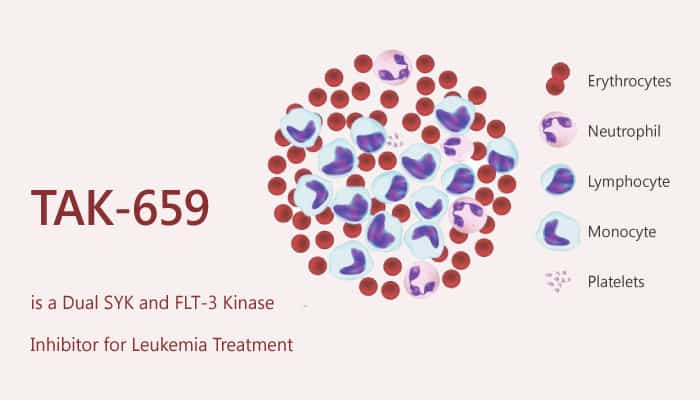Acute Myelogenous Leukemia (AML) is a disease driven by SYK and/or FLT3-mediated signaling. In particular, spleen tyrosine kinase (SYK) is a 72 kD non-receptor cytoplasmic tyrosine kinase. SYK is a key mediator for a variety of inflammatory cells and immunology signaling pathways, including B cell receptor in B cells, FcγR in lymphoid and myeloid cells, and FcɛRI in mast cellss. SYK primarily expresses in hematopoietic cells. Especially, FMS-like tyrosine kinase 3 (FLT3) is an important cytokine receptor involved in normal hematopoiesis. Particularly, mutations in this gene are common in acute myeloid leukemia (AML). TAK-659 is an dual inhibitor of SYK and FLT-3. Particularly, TAK-659 inhibits purified SYK and FLT-3 enzymes with IC50s of 4.3 and 4.6 nM, respectively.

In cultured human tumor cells, TAK-659 potently inhibits the growth of hematopoietic-derived cell lines, with EC50s ranging from 11 to 775 nM. TAK-659 demonstrates potent tumor growth inhibition after 20 days of treatment. In the FLT3-dependent MV4-11 xenograft model, TAK-659 shows tumor regression at 60 mg/kg daily after 20 days of dosing. TAK-659 inhibits Syk activation and BCR signaling in co-cultured primary chronic lymphocytic leukemia cells and Burkitt’s lymphoma cells. Besides, TAK-659 treatment results in a dose-dependent reduction in the phosphorylation of SykTyr525, Btk, NFκB, ERK1/2 and STAT3 after B cell receptor stimulation. As a result, inhibition of Syk by TAK-659 induces apoptosis of chronic lymphocytic leukemia cells. Moreover, TAK-659 inhibits the up-regulation of proliferation and activation markers induced by the co-culture in primary chronic lymphocytic leukemia cells. TAK-659 inhibits chemotaxis toward BMSC, CXCL12 and CXCL13.
All in all, TAK-659 is an orally available SYK and FLT3 inhibitor for relapsed/refractory acute myelogenous leukemia.